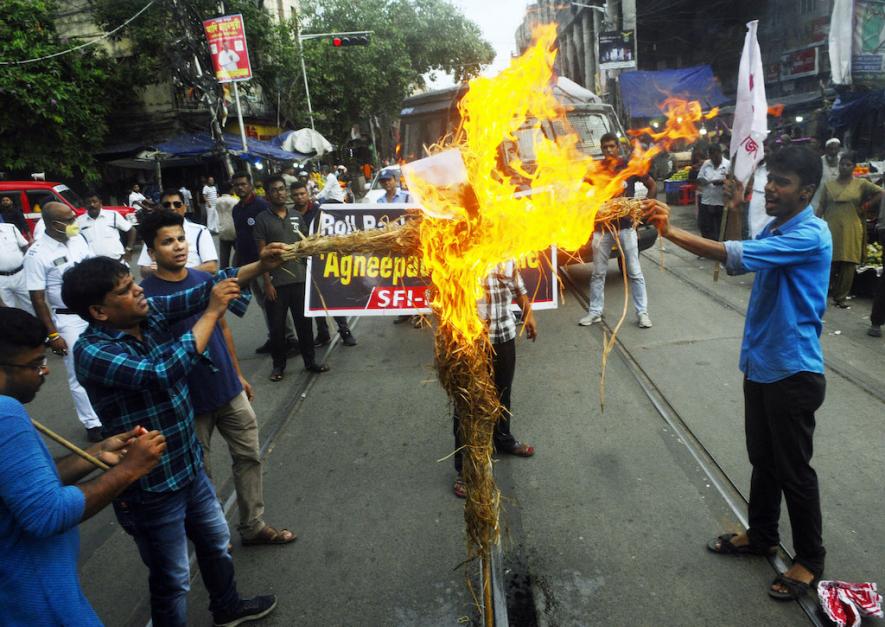Interview: 'Fiddling With Tradition Will Hurt Soldier Morale and Fighting Spirit'

Activities of SFI & DYFI stage protest against Centre's 'Agnipath' scheme
Former vice chief of the Indian Army Lt Gen Zameer Uddin Shah believes the new Agniveer recruitment system was imposed on the armed forces without deliberation and will hurt morale and performance. Gen Shah recently met RSS chief Mohan Bhagwat to raise concerns of the Muslim community. He spoke to Rashme Sehgal about what prompted the meeting with Bhagwat and his views on the government’s continuous tinkering with military traditions.
Recruitment rallies for young people to join the Army under the newly-launched Agniveer scheme have been held nationwide. Several lakh youths have participated. The Indian Air Force received 7.5 lakh applications under the Agniveer scheme for 3,000 jobs. Why—despite changes to the recruitment system?
Unemployment is rampant in the country, with only five per cent of our youth having access to proper jobs. Therefore, anyone who can get a job of whatever nature will go for it.
How well do you think these recruited young people will integrate into the armed forces? After all, it is a four-year job for most recruits, and they will spend part of this time on training.
Under the normal recruitment pattern, training for a jawan is extended for one year, but under the Agniveer scheme, it has been cut to six months. I believe these recruits will be inadequately trained to serve in a unit.
During the four-year tenure of an Agniveer, six months will be spent in training; another eight months will go for annual leaves and then another eight months on pre-retirement formalities. The actual time available to them to serve in a battalion will be two years and two months, most of which will be spent in a field area.
Will the six-month training period be sufficient to prepare a recruit for combat fitness?
The bulk (of Agniveers) will come into the infantry battalions, which will be the major sufferers, not the artillery and the armoured corps, because they require people with technical training.
But there are many other disadvantages to this scheme. Young boys around the age of 16 or 17 years will be applying for the scheme, and 75% of them will be demobilised by 21. They may be physically fit but not mature enough at that age. A soldier’s maturity comes between the ages of 25 and 35. These boys who get discharged may be physically fit but will not be able to find any jobs. Who will give them gainful employment? They will end up feeling extremely frustrated, which will not be good for society. The government claims that the para-military forces and industry will absorb them, but experience shows that most vacancies in the former sector do not get filled.
Another disadvantage for a commanding officer is that 25% of the men under his command will change every year. It took me twenty years to get to know the men (of my regiment), and during that time, I got to know them backwards, including their family history and other details. An intimate knowledge exists between the officer and his men because the Army operates as a tightly-knit family.
Why has the Army’s top brass not spoken out against this as well as the retired veterans?
Army veterans have been speaking out, warning that this is an unwanted scheme, and if the government wants to provide employment, there are other ways. Let them provide employment to these boys directly in the para-military forces. Unfortunately, their voices are not being heard. It is for the army chiefs to speak out. It all depends on them. Chiefs like Gen [KM] Cariappa and Gen [Sam] Manekshaw did not hesitate to voice their opinion on matters on which they differed with the government. That is why I always told my men that though we are subordinate, we are not subservient to political authority.
The government is planning to review many army traditions and customs, including the regimental system that could go back three centuries.
There is a saying that if something works, don’t meddle with it. This is a perfect system, and it would be detrimental to meddle with it.
Let me cite the example of the American Army, which abolished the regimental system in 1951. These changes were induced because of fast-sweeping technological changes, and so they believed they could do away with it. Look what happened to the American Army in the Vietnam war and then again in Afghanistan! Look at what is happening to the Russian Army in Ukraine, where their conscripts are receiving a beating. The Indian Army has tried and tested systems which should not be meddled with.
Does the government also want to change the ceremonial Blue Patrol uniform and lanyard worn by the Army?
Again I would cite the example of the Japanese Army that stood defeated by the United States Army in the Second World War. In the process of demilitarisation of Japan, the United States ordered the Japanese Army to wear ill-fitting and sloppy uniforms that caused their personnel to feel demoralised and ill at ease. I understand this process has been reversed. Uniforms help a soldier stand out.
These changes being ordered on the Indian Army are extremely short-sighted measures. The Blue Patrol is a wonderful uniform. I presented my Blue Patrol uniform to my regiment, and it is displayed in the quarter guard.
I understand the Beating of the Retreat ceremony is also being reviewed because of cost-cutting.
This will be another very short-sighted measure as this beautiful ceremony holds everyone in awe. We must never forget that music is the barometer of a soldier’s soul. There are many other ways of cost-cutting. They can cut the pensions of parliamentarians and MLAs who are entitled to lifelong pensions even when elected for one term.
All this happening when India faces hostile threats from its northeastern and northwestern borders?
Absolutely. The emphasis should be on modernising the Indian Army, not fiddling with its age-old customs and traditions, which will have a detrimental effect on the morale and fighting spirit of the soldiers or on introducing an untried recruitment system.
Why has the government failed to bring out a white paper on national security?
The Army has been crying itself hoarse for a white paper that spells out our national security policy. Sadly, those who are dictating policy understand little about soldiering. We need a body of retired professional soldiers to be given the task of formulating a national security document.
With the majoritarian trends sweeping India, are these changes being felt within the Army? Is there an anti-Muslim trend sweeping the Indian Army?
I cannot speak for what is happening in the Army. But I am part of several Army Whatsapp groups with retired army veterans. If I comment against the government, I am accused of being disloyal and told to go to Pakistan.
I want to point out that during the 1971 war, my regiment took part in the Battle of Longewala. We had three Sikh officers, two Muslim officers, one Christian officer, and one Jewish officer, while the rest were Hindus. We had an inclusive body of officers while our troops were all Rajput. We all fought together, and our only objective was to serve the country.
You were part of a five-member team that met the RSS chief Mohan Bhagwat recently. What was the goal?
It was a peace-making meeting. We wanted to create a thaw in the relationship between Hindus and Muslims.
But you did not raise key issues such as the attempts to economically boycott the Muslim community, lynching Muslims or demolishing homes without fulfilling legal norms?
This was our first meeting. We wanted to break the ice and so chose to adopt a cautious approach. In our subsequent meetings with members of the RSS, we plan to raise all these issues.
Your meeting has received a great deal of criticism, including from Muslims.
Yes, we were accused by some of selling our souls. But the question before us is how do we try and create peace and amity between communities. The best way to remove misunderstandings is to keep talking. Can anyone suggest an alternative method? The RSS has deputed five members with whom we will hold subsequent meetings to try and arrive at some common ground
Get the latest reports & analysis with people's perspective on Protests, movements & deep analytical videos, discussions of the current affairs in your Telegram app. Subscribe to NewsClick's Telegram channel & get Real-Time updates on stories, as they get published on our website.
























